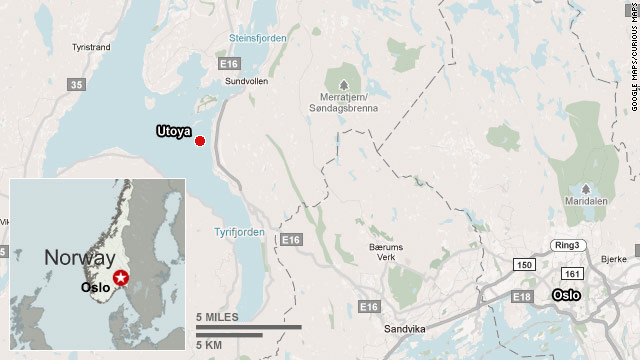Norway wakes changed after nightmare

- Norwegians proud of their progressive, open society
- Norway "a different country" after Friday's attacks, says journalist Jon Magnus
- Fears that people will become more suspicious, lose access to politicians
- Norwegian PM, people, say they won't let attacks destroy their open society
(CNN) -- For Norwegians still in shock from Friday's horrific attacks, there is a sense they have woken up in a country that has "lost its innocence."
With a population of 4.7 million concentrated in the south, Norway's people pride themselves on their progressive, open society -- which has made the bombing and shootings all the more the incomprehensible to them.
Jon Magnus, chief correspondent on the foreign desk at Oslo newspaper VG, was working at the paper's offices on Friday when he was thrown off his chair by the force of the bomb blast.
"I have covered wars and terror attacks around the world for the last 30 years and now it has come to Norway," he said. "We've been so lucky in this part of the world -- it happened every other place, but not here, and now it has happened."
He added: "This morning there were three young girls riding the bus and they were all crying and there were old people talking about how their lives had changed yesterday.
"It's a national trauma in a way. In Oslo people are quiet, whispering -- it's a different country."
 Norway in shock
Norway in shock
 Boater describes rescuing survivors
Boater describes rescuing survivors
 Utoya survivor: 'I'm glad I'm alive'
Utoya survivor: 'I'm glad I'm alive'
 Map
Map
Norway -- on the far northern edge of Europe and partly in the Arctic Circle -- has twice rejected joining the European Union in referenda.
But it is by no means insular. A founding member of the U.N., it has, in recent years, become increasingly active on the international stage, with Norwegian troops joining NATO forces in Afghanistan and taking part in NATO operations in Libya.
Rich in oil and gas, its prosperous economy combines free-market enterprise with government-run industries and an extensive welfare state.
And it's known for its high standard of living, reglarly coming at or near the top of the U.N.'s Human Development Index that looks at health, education and income.
Magnus said that in Norway's famously open society it is normal for top politicians, including the prime minister, to walk the streets of Oslo without protection.
But he believes that will now change. "From today they will probably have bodyguards and police guards and they will go by car and never again stop and talk to people," he said.
Siri Gulestad, head of clinical psychology at the University of Oslo, said Norway had "lost a kind of innocence."
She said another aspect of Norway's open, tolerant society is illustrated by the fact that Norwegian police do not carry guns.
She doesn't believe Norwegians will respond to the attacks by calling for police to be armed or by calling for tighter security measures.
She said: "We won't be asking for extra security -- that would have been much more the case if it (the attacks) had been linked to international terrorism.
"It's shocking, but it's a very different scenario politically if it had been connected to Libya or al Qaeda -- then you would have a discourse afterwards around "do we have enough protection in airports?"
"The American embassy is only building in Oslo where the fences are three meters high with iron all around, we don't like that."
But the scale and nature of the tragedy could impact the national psyche in other ways.
"The scary thing is we were kind of expecting some kind of international organization doing this but it turns out to be an ethnic white lunatic born and raised in Norway, which means a lot of people are going to see spooks in the middle of the day from now on," said Magnus.
"There might be more suspicion in Norwegian society after this," he added.
"Things may go back to normal after a few months but it has changed us. "I think people will maybe be a little more scared, maybe look over their shoulders, maybe some will try to avoid tunnels and subways, at least for a while. This will definitely change our behavior."
But Norway's Prime Minister Jens Stoltenberg said Friday his country would not to be cowed by the attacks, stressing they would instead bring more "openness and more democracy" to Norway.
It's a message that Gulestad believes resonates with all Norwegians.
"In a sense we all say now we will not let it destroy our open society," she said. "Our prime minister says that and I really think that's a wise and good way of expressing how we want to protect what we value so much."








